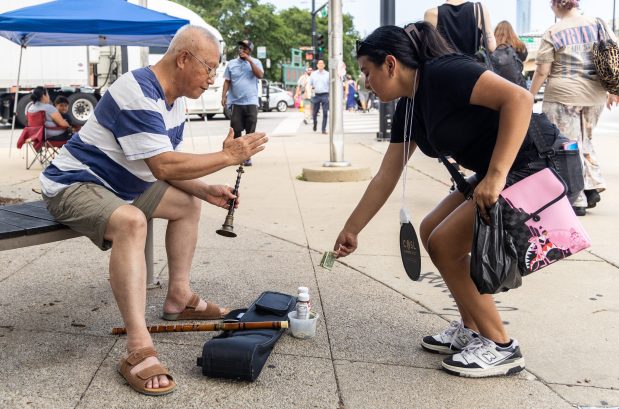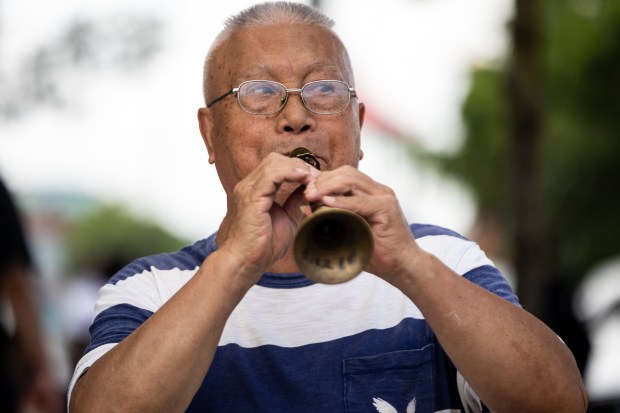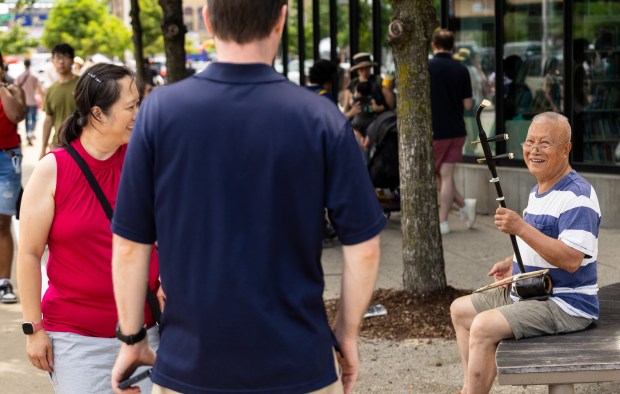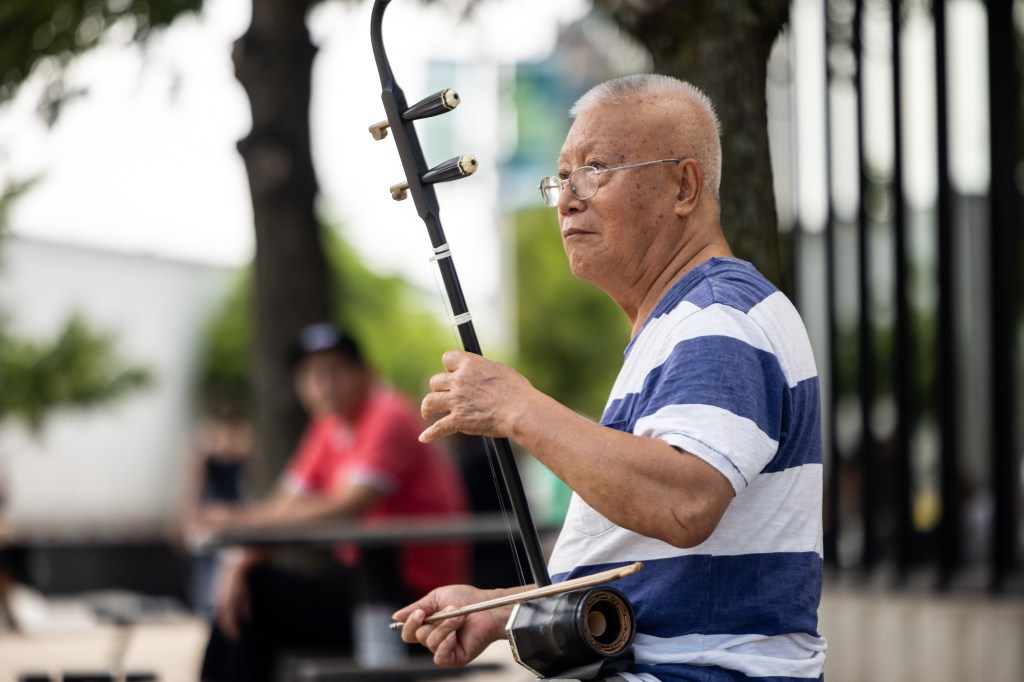With a slight inhale, 81-year-old Zhen Jinling brought the short, ridged horn up to his mouth. He pursed his lips and blew into his suona — the sound part birdcall, part trumpet fanfare.
From a bench outside Chinatown’s library branch, the chirpy melody and fast descending riffs of “Whipping the Horse that Transports Grain,” a Chinese folk song composed in the 20th century, buzzed across the street to the nearby CTA station.
Since 2022, Zhen has spent Saturday and Sunday afternoons busking outside Wentworth and Archer avenues. Rotating between several instruments, Zhen shares a taste of traditional Chinese music with locals and visitors alike.
“(I) entertain the community, entertain myself,” Zhen said last month in Mandarin Chinese.
Zhen, originally from Taishan in Guangdong province, said he came to the U.S. at least 15 years ago. He often played in Chinese opera and folk music companies in Chicago, New York and other areas, focusing on Cantonese opera music, he said.
“Private opera companies don’t have much money,” he said. “I’ve spent my life learning music — giving myself to it.”
Zhen set down his suona and put his erhu, a type of Chinese violin, in his lap. As he drew the bow along the upright strings, a mellower tone floated into the air. It’s nowhere near as loud as the suona, but turned heads nonetheless.
A young man and woman stopped to watch Zhen play.
“May I see it?” The woman asked Zhen in English after he paused, gesturing to the erhu.
 Busker Zhen Jinling, left, thanks a passerby for giving him money while he plays traditional Chinese folk music on the suona, a horn instrument, in Chinatown on July 27, 2025, in Chicago. (Dominic Di Palermo/Chicago Tribune)
Busker Zhen Jinling, left, thanks a passerby for giving him money while he plays traditional Chinese folk music on the suona, a horn instrument, in Chinatown on July 27, 2025, in Chicago. (Dominic Di Palermo/Chicago Tribune)
He scooted over to let her sit downand handed her the instrument. Zhen guided her right hand as she pulled the bow back and forth, the sound shifting from an initial croak to something more sonorous. After about a minute, the impromptu lesson concluded and the woman stood up. Zhen pointed to a cup in front of his instrument cases.
“Yi kuai qian (one dollar),” he said.
She didn’t seem to understand his words exactly, but dropped in a bill anyway.
Zhen started learning music when he was 15, he said. Much of his training came in the Chinese military, where he also performed, he added.
Over the years, he’s learned ways to save money while playing music. While suona reeds are traditionally plant-based, Zhen flattens segments of plastic straws to fit into his mouthpiece. He keeps extras in a small tin, and it’s “all about habit,” he said.
Zhen plays the jinghu and gehu, two bowed, upright string instruments that are in the same family as the erhu. He’s also started learning Western instruments in the past few years, collecting violins, saxophones and guitars, he said.
“If other people can, I have to be able to play as well,” Zhen said of learning different instruments. “If I can’t, it’s a little embarrassing.”
At his age, though, the effort Zhen puts into learning new instruments varies. On the violin, he’s a “lazy” learner — his neck can’t take the strain from playing for too long, he said.
 Busker Zhen Jinling plays traditional Chinese folk music on the suona, a horn instrument, in Chinatown on July 27, 2025, in Chicago. (Dominic Di Palermo/Chicago Tribune)
Busker Zhen Jinling plays traditional Chinese folk music on the suona, a horn instrument, in Chinatown on July 27, 2025, in Chicago. (Dominic Di Palermo/Chicago Tribune)
Yunlong Zhang, who goes by John Lone, is a recent music school graduate. He said he admires Zhen for his depth of musical knowledge and commitment to performing despite the limited financial gain. Lone, who moved to the U.S. from China for school, also said he was glad to hear the suona and erhu — “Chinese sound” — in Chicago.
When two women told Lone one afternoon he should fall back on information technology or computer science in case music doesn’t work out as a career path, he said Zhen chimed in.
“He said, ‘You shouldn’t tell him this, you’ll impact him. You have to respect his personal decisions,’” Lone said in Mandarin Chinese. “His personality is pretty interesting.”
After a weekend of thunderstorms and other severe weather, Zhen was back to busking July 27. His performance coincided with the Chinatown Summer Fair, which saw increased foot traffic in the area — and past the corner where he plays.
Hearing Zhen play was “really captivating,” said University of Illinois Chicago student Nabharun Bhattacharya. He had seen social media posts of buskers in Chinatown, but this was his first in-person experience, Bhattacharya added.
“A movie without background music is just frames passing through your eyes, right? Similarly, if there’s good music and ambience, it heightens the whole experience,” Bhattacharya said.
Eric and Jennifer Burpee, a married couple who went to Chinatown after church earlier in the day, also stopped by Zhen’s post to listen and donate money.
The couple also played instruments growing up — Jennifer Burpee learned clarinet and Eric Burpee the trumpet. They said Zhen played “confidently,” and Jennifer Burpee recognized much of his music as built on the pentatonic, or five-tone, scale.
“I’m pretty awestruck that he can play three instruments,” Jennifer Burpee said.
 Busker Zhen Jinling, right, thanks Eric and Jennifer Burpee of Midlothian after they gave him money outside the Chinatown Branch of the Chicago Public Library on July 27, 2025, in Chicago. (Dominic Di Palermo/Chicago Tribune)
Busker Zhen Jinling, right, thanks Eric and Jennifer Burpee of Midlothian after they gave him money outside the Chinatown Branch of the Chicago Public Library on July 27, 2025, in Chicago. (Dominic Di Palermo/Chicago Tribune)
Jennifer Burpee is part Chinese and grew up in Bridgeport. While she frequently visited Chinatown when she was younger, Burpee didn’t recall seeing street performers around the neighborhood.
Now, in part because of more frequent organized cultural performances in the area, Burpee said she hears more buskers on the streets, including those playing traditional Chinese music.
She and her husband hope there are more buskers around the neighborhood and city. Public performances add to the “culture and experience of the city and Chicago as a whole,” Eric Burpee said.
The third instrument in Zhen’s rotation was the xiao, a Chinese flute made of bamboo. Holding it sideways, he played a wistful tune, the tone soft and almost hoarse.
“My strength no longer matches my heart,” Zhen said. “I’m out of breath now.”
Still, Zhen said he doesn’t plan on stopping his street performances any time soon. His hope?
“That people hear my music and are happy,” Zhen said.
